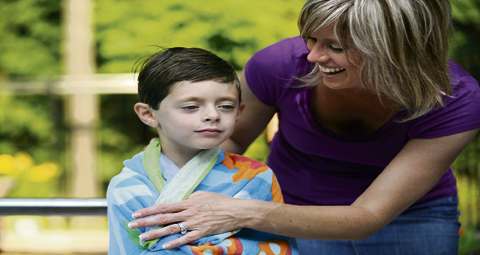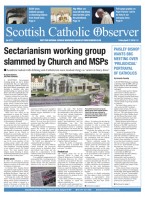May 16 | ![]() 0 COMMENTS
0 COMMENTS ![]() print
print

We are all guided by a motherly love
Fr Ronald Rolheiser
There’s an old adage that offers a wise counsel, even as it leaves us powerless to heed its advice: Pick your parents wisely. Easier said than done; but the adage holds. We are not fully our own persons. We are also products of our parents, who not only give us our physical DNA, but—in complex confluence of how they are inside their own persons and how they relate to us and to the world—also profoundly help shape our person and our character. As adults, it can be both freeing and emotionally-crippling to reflect upon exactly what we really inherited from our parents. They shape us.
I have this in the back of my mind today—Mother’s Day in the US—as I reflect upon my own mother and the DNA that I inherited from her. She died 43 years ago but she left a lot of herself here, with my siblings, with me. What did she give me, beyond some of my bodily features?
What she gave me did not happen in a vacuum. She raised a large family, with the help of a very supportive husband—my dad—and, while they had a marriage made in Heaven, they had to spend most of it chronically strapped for money, time, and energy. The demands on her were always somewhat beyond that for which she had adequate resources. But, somehow, she always managed, always managed to make do, always found a way to stretch everything, including her time and energy, to feed, cloth, and properly mother us.
She frequently did not have the time, energy, or heroic patience to provide us with the individual affection and warmth that a child so desperately desires and needs, even though she was a naturally warm and kind-hearted person. The pressure of so many needs could wear her idealism and attention pretty thin at times. And so she was not a Hollywood mum, always perfectly dressed and perfectly affectionate; but she gave us—and in spades—the most important thing that a home is really asked to give, safety and security. The one need in a child that trumps all others is the need to feel safe and secure.
My mother was often torn in so many directions that she couldn’t give us her full attention and warm affection, but she did provide us with what we needed most of all, safety and security. She gave us a house and a home that was always steady and robustly sane—often times, loudly so. Inside that ambience we were always safe. Nobody could have given me a greater gift or greater riches in my youth.
Moreover, inside all that busy-ness, scrambling to provide, and the conscriptive attention deficit disorder that she had chronically to deal with she taught us something else of importance, namely, that you do not have to wait until everything is perfect, until all your bills are paid, your health is perfect, you have the right leisure time, and there are no large headaches waiting for you tomorrow, in order to celebrate and enjoy a moment. She knew how to celebrate the temporary. Every feast-day, birthday, or Sunday was an occasion for a special meal and a special celebration no matter whatever might be putting a damper on life. And, perhaps most important of all, my mother was largely responsible for giving me faith, though, in this, she had my dad as an equal partner; however she, more than anyone else, pushed me to be open to hear the call to priesthood.
Anthropologists who study initiation rites in various cultures tell us that the initiatory process needed to move someone from being a child to an adult needs to instill four salient truths: Your life is not your own. Life is hard. You will die. Your life is not about you.
The culture and Church out of which she came had already indelibly etched those truths into her. For her generation—especially if you were poor and lived in a rural area—life was naturally hard and mortality rates were high. Lots of people died young. And the ethos of her generation held that family, Church, neighbour, and country could ask you for your life, and your duty was to give it over, without whining or self-pity. It was selfish to think first of yourself. She had inhaled that ethos and then she etched it into us, particularly the truth about your life as not being about you. The other facts, that life was hard and that you were going to die, were left to speak for themselves; but, from the time you graduated from toys to school, the message was clear: Your life is not your own. Your life is not about you. Anthropologists might well study my mother’s initiatory vision and tactics.
No mother is perfect, and neither was mine. She had her faults and I carry many of those too, along with the better things she gave me. But, reflecting on my mother, I have only good feelings and warm gratitude. I chose my mother wisely.
— Fr Ronald Rolheiser is a Catholic priest and member of the Missionary Oblates of Mary Immaculate. He is president of the Oblate School of Theology in San Antonio, Texas. Visit his website at www.ronrolheiser.com











